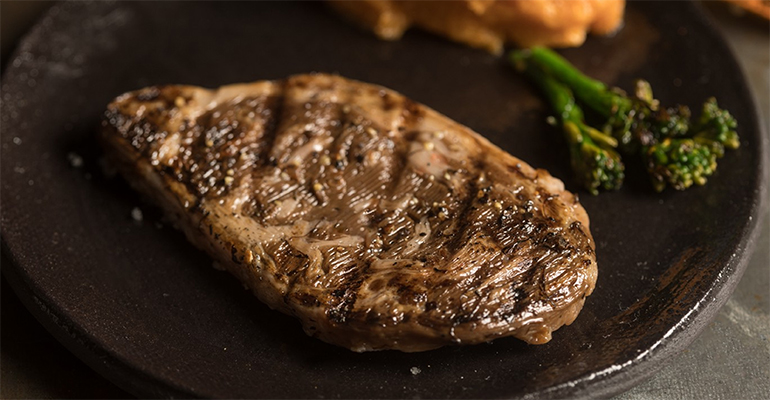News
Aleph Farms is bringing cultivated steak to Brazil
19 Mar 2021This month, cell-based meat producer Aleph Farms partnered with Brazilian-based BRF S.A. in a Memorandum of Understanding (MoU) agreement that will bring cultivated meat to the Brazilian market. Under the agreement, the two companies will co-develop a cultivated meat product using Aleph’s BioFram technology platform, and BRF will distribute the products In Brazil.
“As one of the largest beef producers in the world, Brazil is a strategic market for us,” Didier Toubia, co-founder and CEO of Aleph Farms said in a statement. “This new partnership advances Aleph Farms’ strategy to integrate into the existing ecosystem as part of our go-to-market plans.”

Aleph Farms is quickly scaling up its go-to-market strategy. In January, the cell-based meat company said that it was going to bring its technology to Japan through a partnership with Mitsubishi, but through these partnerships, the company is looking to create something more than a cell-based meat product that vaguely resembles meat. Instead, Aleph is looking to create meat analogues that can stand on their own; in February the company announced that it had successfully printed the first ribeye steak.
While its new partnership with BRF, which was unveiled in December 2020, is expected to generate $18.5 billion by 2030, this pair still needs to contend with the reality that price parity with animal protein and governmental approval for commercial sale continue to remain barriers to the widespread adoption of cultivated meat. However, BRF has expressed confidence that consumer demand will change that.
“Since 2014, we have witnessed an increasing global demand for new sources of protein driven by several factors, namely environmental concerns, new diets and lifestyles, which has spurred the growth of new dietary genres including flexitarianism, vegetarianism and more,” said Lorival Luz, chief executive officer of BRF in a statement.
With Brazil recently reaffirming the UN (United Nations Framework Convention on Climate Change - UNFCCC) and committing to reducing total net greenhouse gas emissions by 43% in 2030, this hope might soon become a reality. Livestock accounts for a significant proportion of the world’s greenhouse gas emissions, and with the Untited Nations predicting the global population to reach 9.8 billion by 2050, cell-based meat presents a solution to help incorporate innovation into the local agricultural ecosystem and allow companies and countries reach their climate goals.
Related news

Oat Barista: Innovation for game-changing beverages
20 Nov 2025
Oat Barista is a clean label, sustainable, and innovative drink base specifically designed to create the perfect foam in one single ingredient.
Read more
Nitrites: Pressure grows on UK to follow EU’s lead
20 Nov 2025
Pressure is growing on the UK to follow the EU’s lead after the bloc revised its regulations on the permitted levels of nitrites and nitrates in cured meats.
Read more
Empowering innovation in fortification and colouration
13 Nov 2025
Divi’s Nutraceuticals offers a large portfolio of innovative, high-quality ingredients for foods, beverages, and supplements, with bespoke solutions and expert support for product success.
Read more
Danone highlights digestive health as potential ‘tipping point’ for food industry
13 Nov 2025
Danone is betting on a food industry “tipping point” that will bloat the market for healthy products, particularly those related to gut health.
Read more
Standing Ovation and Bel scale up casein production from dairy co-products
11 Nov 2025
Foodtech company Standing Ovation has partnered with cheese specialist Bel Group to manufacture dairy serums for industrial-scale casein production via precision fermentation.
Read more
AI attraction means foodtech startups must ‘prove’ rather than ‘promise’
4 Nov 2025
Reports suggest that artificial intelligence (AI) is sucking investment from foodtech and agritech, but investors say the picture is complicated.
Read more
Will postbiotics become the go-to functional ingredient?
3 Nov 2025
Postbiotics show significant promise for the functional foods market due to their safety profile and beneficial bioactive properties, research suggests.
Read more
Meet the finalists of the Fi Europe Innovation Awards 2025
31 Oct 2025
Who made it to the shortlist of the Fi Europe Innovation Awards 2025? Read about the 23 companies making food and drink products healthier and manufacturing processes more efficient.
Read more
Penguin and Club bars no longer classed as chocolate
30 Oct 2025
Penguin and Club bars can no longer be classified as chocolate after the pladis-owned McVitie’s brands turned to cheaper alternatives amid the ongoing cocoa crisis.
Read more
Shorter drying time, sweeter success!
30 Oct 2025
Curious about cost-effective, sustainable and delicious candy making? Stefan Wessel reveals how Avebe’s solutions reduce drying time and energy use by up to 50%.
Read more